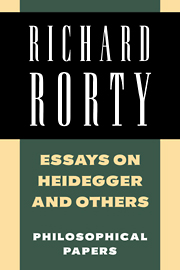Book contents
Two meanings of “logocentrism”: A reply to Norris
Published online by Cambridge University Press: 14 January 2010
Summary
“The discourse of philosophy” is to early Derrick as “Being” is to late Heidegger. Both terms refer to something we can never simply walk away from, but instead must constantly struggle with. As Christians think God inescapable and Heidegger thinks Being inescapable, so Derrida thinks “the discourse of philosophy” inescapable. All our attempts to do without it are relations to it. It follows us down the nights and down the days. It waits at the end of every road that seems to lead away from it. Just as Freud thought that we never cease from erotic struggle with images of our parents, no matter how long we live or how little we consciously think about them, so the early Derrida thinks that we cannot escape from logocentric discourse. For him, as Norris says, “philosophy's influence on our language and habits of thought is utterly pervasive.” Just as Freud thought that we might be able to replace neurotic misery with ordinary human unhappiness by realizing that our struggle with those figures of infantile fantasy is interminable, so may we replace self-deception with the endless labor of deconstruction by realizing that there will never be a last philosophical discourse.
If (but only if) philosophy's influence is that pervasive, we have no choice but to use, as Norris says, “the language that comes to hand (along with its inescapable logocentric residues) … in precisely such a way as to bring out its inherent strains and contradictions.”
- Type
- Chapter
- Information
- Essays on Heidegger and OthersPhilosophical Papers, pp. 107 - 118Publisher: Cambridge University PressPrint publication year: 1991
- 3
- Cited by

